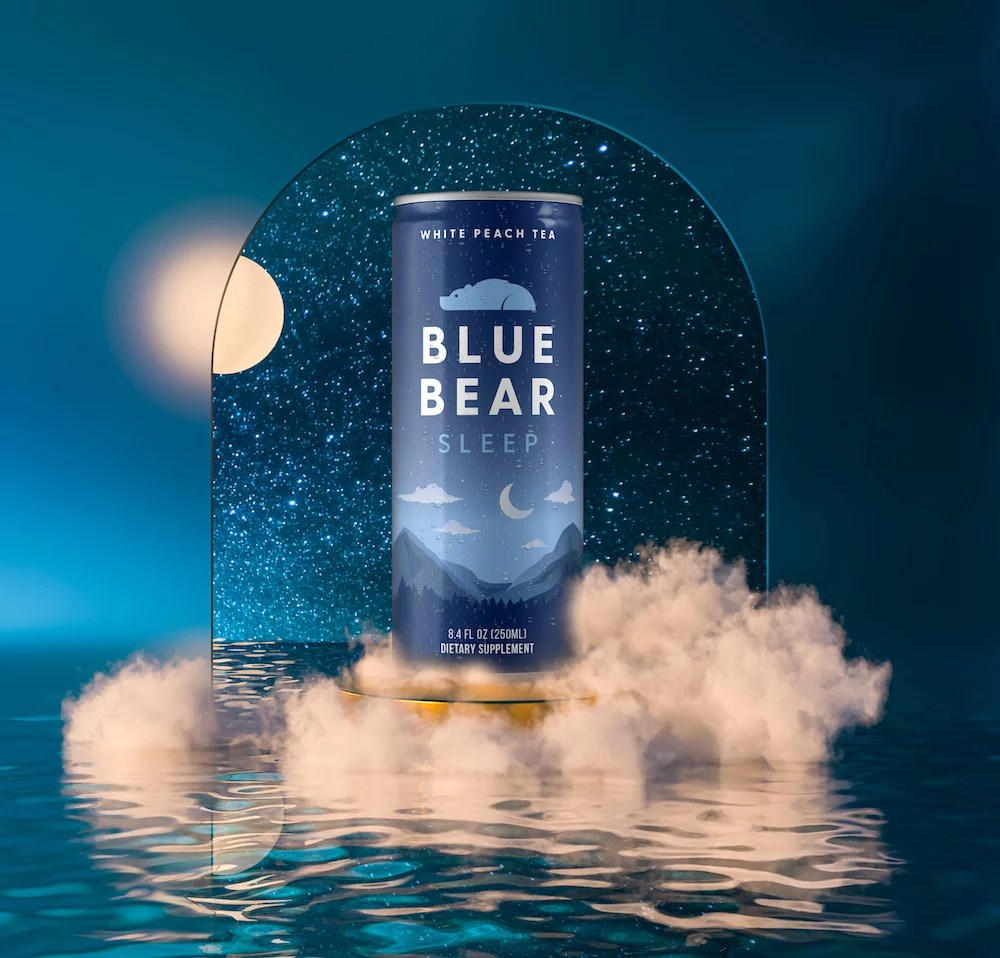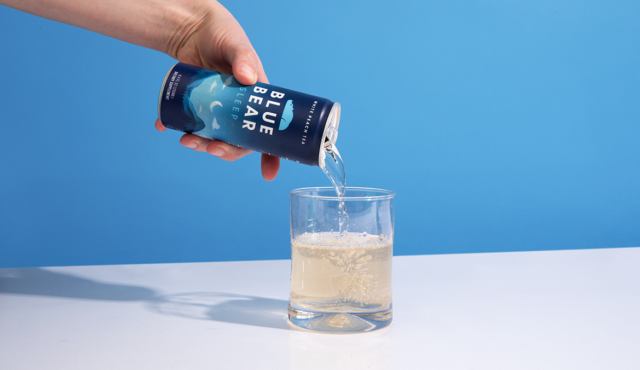But let me preface: For me, the issue isn’t falling asleep quickly—I’m actually quite good at that. What I struggle with is staying asleep throughout the night and waking up feeling at all rested. That said, since working at Well+Good, I’ve been privy to tons of sleep-boosting knowledge and have tried nearly every remedy in the books from drinking magnesium-infused sparkling water to making sleepy girl mocktails a nightly ritual with the hopes of getting better rest. In short, I’ve (nearly) tried it all—and, yes, some things work better than others, which involves a lot of trial and error.
When chatter about Blue Bear Sleep, a new functional sleep drink, landed in my inbox, I was initially skeptical, thinking to myself “been there, done that.” Although it wasn’t long before I *quickly* changed my mind once I learned more about their unique sleep-supporting blend of ingredients like L-theanine, lavender, and chamomile. But did Blue Bear work for me to get a good night’s rest? Read on to find out. (Spoiler alert: It helped… I think?!)
What is Blue Bear and how can this drink help with getting better sleep?
This functional sleep drink comes in one flavor, white peach tea, and is organic, naturally-flavored, and non-carbonated. The tea-based drink is also uncaffeinated and contains zero grams of added sugar.
What makes this drink ideal for promoting sleep? It features a blend of six primary sleep-supporting ingredients: melatonin, L-theanine, GABA, chamomile, lavender, and ashwagandha. Let’s break down each.

Melatonin
Each can of Blue Bear contains five milligrams of melatonin, a naturally-occurring hormone that works with your body to promote healthy sleep cycles. Although melatonin isn’t the be-all, end-all when it comes to sleep aids, behavioral sleep specialist Carleara Weiss, PhD, sleep science advisor for Aeroflow Sleep, says that it can help reset your circadian rhythm. The ideal dose of melatonin for adults, she adds, ranges from 0.5 to five milligrams; it should be taken 30 minutes to one hour before bedtime. Keep in mind that having too much melatonin can lead to adverse effects such as dizziness, headaches, and nausea, or in some cases, vivid dreams or nightmares. Blue Bear’s drink is right at that five-milligram threshold.
L-theanine
We’ve often spoken about the benefits of L-theanine, seeing how it’s been linked to boosting longevity, mood, and even happiness levels. But according to Michael Breus, PhD, leading sleep specialist known as “The Sleep Doctor” and clinical psychologist, L-theanine is a key ingredient in helping the brain relax by reducing stress-related hormones and neuron excitement. This is why the sleep expert recommends consuming green tea (a great source of L-theanine) several hours before bedtime to reap its sleepytime benefits.
It’s worth noting that researchers haven’t quite nailed the target dosage of L-theanine for sleep, though some studies suggest that 200 milligrams may be an appropriate amount. (For context, Blue Bear contains 102 milligrams of L-theanine per can.)
GABA
Gamma aminobutyric acid, aka GABA, is a naturally occurring amino acid that reduces activity in the central nervous system. According to Uma Naidoo, MD, a Harvard-trained nutritional psychiatrist, professional chef, nutritional biologist, and author of the national and international bestseller, This Is Your Brain on Food, GABA is effective in slowing down some brain activity, which can help relax the mood to achieve better rest.
Research has also shown that low GABA levels are correlated with certain psychiatric conditions, including generalized anxiety disorder and major depression. Thus, increasing levels of this amino acid may potentially help with sleep- and relaxation-boosting benefits, although more research is needed on the topic to definitively say.
Chamomile
Although there’s only limited scientific evidence indicating that chamomile is an effective sleep aid, sleep specialists say it can potentially help with boosting relaxation to help you sleep better as it may have some influence on the nervous system. That said, chamomile does contain a bevy of additional benefits, including its ability to help soothe an upset stomach and has antibacterial properties.
Lavender
Much like chamomile, lavender may be helpful in promoting relaxation thanks to some research showing that lavender may inhibit several neurotransmitters and have pain-relieving and sedative effects, although more research is needed on the topic.
Ashwagandha
Lastly, we have ashwagandha, an ancient medicinal herb (or adaptogen) touted for its potential to reduce cortisol levels and boost overall wellness. The good news is that evidence suggests that ashwagandha may be effective in helping treat and prevent adrenal fatigue, a condition that can lead to extreme, constant exhaustion that can affect cortisol levels, Will Cole, IFMCP, DNM, DC, a leading functional medicine expert, previously shared with Well+Good. By keeping cortisol levels at bay, folks may be able to achieve better rest come nighttime.
@bluebear Are you ready to say goodbye to restless nights and hello to a better sleep experience? Try Blue Bear 💙🐻 ##sleeptips##nighttimeroutine ♬ Daily Bread – L.Dre
My experience drinking Blue Bear Sleep drink every night for a week
When it comes to sleep-supporting products, I typically approach with caution: I don’t generally like taking too many supplements of any kind (I have a sensitive stomach), and usually prefer to get my nutrition via what I eat. However, sometimes, this isn’t always possible, and finding ways to boost sleep can be a tricky topic involving a lot of trial and error. So, I decided to give Blue Bear (which is also available on Amazon) a shot for just a week, and here’s how it went.
Since I didn’t want to get up in the middle of the night to alleviate my bladder, I drank a can of Blue Bear about an hour before hitting the hay every night for a week while I simultaneously made a conscious effort to disconnect from my devices and focus on setting the mood for optimal relaxation—which for me, involves some light reading on my Kindle.
Within about 20 minutes of finishing the drink—which has a not-very-sweet and mostly watered-down peach-like flavor—I began noticing that my body was a bit more relaxed and my usual baseline anxiety levels were seemingly calmer. 40 minutes later, I was ready for sleep and quickly drifted away into a relaxing slumber.
Come morning, I found that on most nights of my trial I made it without waking up—a huge plus in my book. Although, in some instances—about three of the nights—I woke up once to use the bathroom (a usual occurrence for me), but found I was able to go back to sleep shortly after. Aside from getting to sleep sooner and not waking up often, I noticed that I had more vivid dreams during my week-long trial period than usual. Unlike most nights where I tend to forget my dreams come sunrise, the nights I drank Blue Bear were paired with dreams more imaginative than usual—which can be a blessing or a curse, depending on how you look at it.
All in all, the nights where my dreams weren’t too crazy, I got some of the best sleep I’ve had in a while. But then again, there were some nights where my dreams made me feel a bit restless in the morning. That’s to say, I think finding the sweet spot for dosage is key—for me, it’ll likely involve drinking only half a can of Blue Bear a night, and saving the other portion for the next day.
This herbal tea can help prepare you for a good night’s rest:
Well+Good articles reference scientific, reliable, recent, robust studies to back up the information we share. You can trust us along your wellness journey.
- Rao, Theertham P et al. “In Search of a Safe Natural Sleep Aid.” Journal of the American College of Nutrition vol. 34,5 (2015): 436-47. doi:10.1080/07315724.2014.926153
- Allen MJ, Sabir S, Sharma S. GABA Receptor. [Updated 2023 Feb 13]. In: StatPearls [Internet]. Treasure Island (FL): StatPearls Publishing; 2023 Jan-. Available from: https://www.ncbi.nlm.nih.gov/books/NBK526124/
- Adib-Hajbaghery, Mohsen, and Seyedeh Nesa Mousavi. “The effects of chamomile extract on sleep quality among elderly people: A clinical trial.” Complementary therapies in medicine vol. 35 (2017): 109-114. doi:10.1016/j.ctim.2017.09.010
- López, Víctor et al. “Exploring Pharmacological Mechanisms of Lavender (Lavandula angustifolia) Essential Oil on Central Nervous System Targets.” Frontiers in pharmacology vol. 8 280. 19 May. 2017, doi:10.3389/fphar.2017.00280
Our editors independently select these products. Making a purchase through our links may earn Well+Good a commission.










